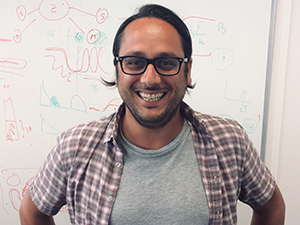Suffering from psychological stress could further increase cancer risk in those already genetically predisposed to the disease, according to new research.
The findings show that the stress hormone cortisol increases the risk of breast and prostate cancer in people with BRCA mutations.
The research offers biological evidence that this high-risk group of patients could benefit from psychological interventions such as therapy and mindfulness to prevent the development of cancer.
The findings, from The University of Brighton and The Institute of Cancer Research, London, also indicate that targeting the cortisol receptor with a drug could be a potential strategy to help prevent cancer in those most at risk. Such drugs already exist and are approved for other conditions.
Inherited genes raise the risk of cancer
Mutations in the BRCA1 and BRCA2 genes – the latter of which was discovered at The Institute of Cancer Research (ICR) – are found in one in 400 people. They raise the risk of certain cancers, including breast and prostate, as cells are unable to repair DNA damage. Cortisol has previously been shown in the laboratory to damage DNA.
Through lab experiments on BRCA-mutated cells and long-term studies on people with BRCA mutations, the new research shows how stress impacts cancer development in this group.
Stress hormone cortisol affects DNA damage repair
The team found that BRCA-mutated breast cells treated with cortisol undergo DNA damage which is unable to be repaired – compared with non-BRCA cells, which were able to repair the DNA after 30 minutes.
The team also studied people with BRCA mutations and found that those who developed breast and prostate cancer had higher cortisol levels than those who did not.
Cortisol levels are higher in those who develop cancer
In research funded by the ICR – which is a charity as well as a research institute – Cancer Research UK, and the Rosetrees Trust, published in the British Journal of Cancer, the team looked at 62 female BRCA carriers who had been followed over 10 years.
They looked at levels of cortisol in plasma and urine samples taken over the years. Women with higher plasma cortisol levels were more than twice as likely to develop breast cancer than those with lower levels.
The team saw the same trend in 70 male BRCA carriers – the men who developed prostate cancer had higher cortisol levels. In these men, a marker of DNA damage was also higher in those who went on to develop prostate cancer.
The researchers say the results provide an insight into the mechanism by which stress may influence cancer, and that they highlight the potential of targeting the cortisol receptor to protect BRCA carriers from disease.
Prevention strategies should include psychological support
Professor Ros Eeles, Professor of Oncogenetics at The Institute of Cancer Research, London said:
“Certain genetic changes can significantly increase a person's risk of developing cancer, such as mutations in the BRCA genes – one of which was discovered here at the ICR. With this knowledge, we can take proactive steps to reduce that risk, such as preventative surgeries and regular screening to detect cancer early.
"Our study adds a new layer to this understanding by exploring how psychological stress interacts with these genetic mutations. We found that, in individuals with a BRCA mutation, stress may contribute to cancer development. This appears to be linked to cortisol, a stress hormone that can damage DNA – particularly in cells already compromised in their ability to repair themselves.
"Living with a BRCA mutation can be inherently stressful, and while these findings may seem concerning, they also empower us. Knowledge is power. By integrating psychological support – such as group therapy, mindfulness, and cognitive behavioural therapy – into prevention strategies, we can better protect those at risk. We hope that this will also drive research into future treatments targeting the cortisol receptor, to help prevent disease.”
Professor Melanie Flint, Professor of Stress and Cancer Research at the University of Brighton, said:
“Our data suggests that stress may play a role in cancer initiation in high-risk individuals however, further work is warranted to assess daily salivary cortisol levels to confirm this.”
‘Take steps to try to reduce stress levels’
Catherine Priestley, Senior Clinical Nurse Specialist at Breast Cancer Now said:
“When someone is diagnosed with breast cancer, it’s completely natural for them to wonder what has caused it. It’s important to remember that breast cancer risk is influenced by many different things – including genetics, lifestyle and environment, many of which are out of our control.
“This study suggests that high levels of the stress hormone cortisol could be contributing to breast cancer development in people who are already at high risk due to inherited altered BRCA genes. But it doesn’t mean that stress causes breast cancer. Stress and stressful life events happen to all of us. And while it wasn’t specifically looking at this group of people, we know from our landmark Breast Cancer Now Generations Study that stressful major life events like bereavement or divorce are unlikely to cause breast cancer.'
“But people experience stress very differently and we welcome more research like this to further understand the impact that stress can have on people’s physical health, wellbeing and quality of life.
“And we would always encourage people to take steps to try and reduce stress levels and look after their wellbeing in ways that are right for them, as well as reaching out for support if they need it.
“Anyone seeking information and support can speak to Breast Cancer Now’s expert nurses by calling the charity’s free, confidential helpline on 0808 800 6000 or on email, or visit breastcancernow.org.”
.tmb-propic-md.jpg?Culture=en&sfvrsn=c25d2b2f_9)
 .
.
